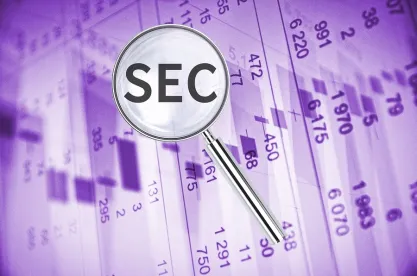In an interesting twist, a federal court has revisited its earlier decision in SEC v. Blockvest, where it denied the SEC’s motion for a preliminary injunction against issuers of the BLV token, this time granting the SEC’s motion. The opinion has important implications for cryptocurrency issuers.
Allegations
According to the complaint filed by the SEC, Blockvest, LLC and its chairman/founder publicly claimed to have sold tokens called BLV. The SEC alleged that Blockvest made a number of misrepresentations in connection with these purported sales. Blockvest purported to be the “First Licensed and Regulated Tokenized Crypto Currency Exchange & Index Fund based in the US,” but the SEC alleged that it had not approved, authorized, or endorsed Defendants or their token sale. Similarly, Blockvest claimed that the ICO had been approved by the CFTC and National Futures Association and that Defendants had been audited by accounting firm Deloitte, also false according to the SEC’s complaint. The complaint further alleged that Defendants published information about a fictitious regulatory agency, the Blockchain Exchange Commission, complete with a fake government seal, logo, mission statement, and address (nearly identical to the SEC’s).
Proceedings
The SEC filed its complaint in the Southern District of California in 2018, asserting violations of multiple securities laws: Section 10(b) of the Exchange Act and Rule 10b-5 (for fraud); Section 17(a) of the Securities Act (for fraud); and Section 5 of the securities act (for unregistered sale or offer of securities). The SEC also sought a temporary restraining order halting Defendants’ conduct, which the Court granted, as well as a preliminary injunction.
In opposition to the SEC’s request for a preliminary injunction, Defendants asserted that Blockvest never sold any tokens to the public. Rather, Defendants claimed that Blockvest had only one, private investor, Rosegold Investments LLP (run by Blockvest’s chairman/founder). Defendants further claimed that the BLV token was a test token used to interact with the Blockvest Exchange and that they distributed BLV tokens to 32 exchange testers, who could not keep or remove the tokens, though Defendants admitted that the 32 testers deposited Bitcoin and Ethereum onto the exchange (less than $10,000 worth). Defendants claimed they planned to eventually issue a different token, the BLVX, for actual use on the exchange by customers.
The court initially denied the preliminary injunction, holding, among other things, that the SEC had failed to demonstrate likelihood of success on its burden to prove that the BLV tokens constituted a security. But the SEC moved to reconsider, and on February 14, 2019, the court granted the motion and issued the preliminary injunction.
Court Analysis
In analyzing the propriety of a preliminary injunction, the Court first had to determine whether the SEC had demonstrated likelihood of success in proving that the BLV tokens constituted securities. The Court looked to the now well-worn Howeytest, under which an asset is considered a security (specifically an investment contract) if it constitutes (1) an investment of money (2) in a common enterprise (3) with an expectation of profits from the efforts of others.
Defendants argued that they informed the investors that they were merely testers and that as a result, Defendants did not suggest and the testers did not believe that they would profit from the token. The Court agreed but noted that while Defendants may not have sold any tokens to non-testers, the securities laws at issue apply equally to “offers” to sell (even where no sale is actually completed). The Court then observed that Defendants’ public marketing materials (including white paper and social media) offered potential investors the opportunity to provide digital or other currency in exchange for BLV tokens with a “buy now” button, and the Court held that this satisfied the first Howey prong (an investment of money). The Court next observed that Defendants’ white paper stated that the BLV token entitled its holder to a share in Defendants’ profits and held that this satisfies the second Howey prong (investment in a common enterprise). The Court further observed that Defendants’ marketing materials stated that holders would be “passive” investors and held that this satisfied the third Howey prong (profits resulting from the efforts of others).
Finally, the Court held that the definition of “offer” under the securities laws is broad and encompasses the marketing material statements above. Standing on the breadth of the definition of “offer” under the securities laws, the Court rejected that Defendants’ lack of any actual intent or ability to sell BLV tokens prevented a finding that they had offered such tokens.
Takeaways
Blockvest leaves at least two important takeaways. First, while the SEC Chairman has stated that he believes nearly all cryptocurrencies constitute securities and the SEC staff has vigorously pursued enforcement against issuers (see prior blog post here), courts are the ultimate arbiter of what constitutes a security. The Court’s initial denial of a preliminary injunction in Blockvest led some to believe that courts may not accept the expansive regulatory jurisdiction of cryptocurrency that the SEC has asserted. But this decision suggests otherwise, and the SEC has already trumpeted it as a victory. Undoubtedly we should expect to see the SEC double down on its expansive assertion of regulatory jurisdiction over cryptocurrency.
Second, Blockvest should serve as a reminder that under U.S. securities laws, the SEC regulates offers to sell securities (with “offer” broadly defined) as stringently as actual sales (see, for example, the SEC’s regulation of foreign issuers). Issuers in particular should take great care to avoid making statements in marketing materials (such as white papers, social media accounts, or websites) that might constitute an offer of tokens not registered with the SEC or exempted.



 />i
/>i
